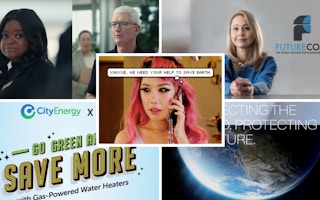2023 was the year that policymakers in Asia Pacific took cues from regulators in the West and made tentative steps to police greenwashing.
South Korea became the first Asian country to fine companies for making exaggerated green claims in February, following a law suit against an energy major that claimed it could produce “carbon dioxide-free” natural gas. But the maximum fine for greenwashing firms in Korea is US$2,300, prompting questions on whether it makes an impact at all.
Japan, Australia, Hong Kong and Singapore are among the Asian countries have released guidelines for how the finance sector can avoid greenwashing in environmental, social and governance (ESG) disclosures.
Singapore is considering using technology – artificial intelligence – to weed out iffy claims, and Australia’s advertising watchdog is tightening its environmental claims code after a study found a jump in misleading marketing campaigns.
Asia’s public relations industry association finally produced guidelines for brands on how to communicate sustainability credibly in October, more than a year after announcing it would. Singapore’s advertising watchdog became the first in Asia to call an advertisement out for greenwashing in December.
Japan-based academic Kim Schumacher, who coined the term “competence greenwashing” to describe people or companies that embellish their green credentials to land a new job or contract, told Eco-Business Podcast that there have been fewer law suits and regulations that hold corporations’ feet to the flame for greenwashing in Asia partly of the cultural tendency to avoid conflict.
Meanwhile, law suits against brands accused of trumping up their green credentials in the West gained momentum, and regulators started to turn the screw on companies guilty of greenwash. The European Union moved to ban the term “carbon neutral” and outlaw climate claims based purely on carbon offsetting.
At the COP28 summit, activist group Clean Creatives launched a report highlighting how advertising and public relations agencies had a part to play in the rebranding strategy of the United Arab Emirates to present itself as a leader in renewable energy in the lead-up to the climate talks. It identified 18 agencies that worked for COP28, the UAE presidency, Masdar and UAE’s state-owned oil company Adnoc from 2021 to 2023, and among them 10 agencies that “double dealed” and worked simultaneously for the COP28 presidency and on fossil fuel contracts.
Though some brands retreated into their shells and stopped communicating their sustainability credentials for fear of getting accused of greenwashing – a phenomenon known as greenhushing – there were more cases of brands getting called out for greenwashing in 2023 than the previous year, when 18 cases were highlighted – up from 11 in 2021 and eight in 2020, according to Eco-Business’ reporting on the issue.
Eco-Business casts a critical eye over the 22 times brands made green claims in 2023 that did not appear to pass the credibility test.
Apple: Sustainability report cherry-picking blessed by Mother Earth
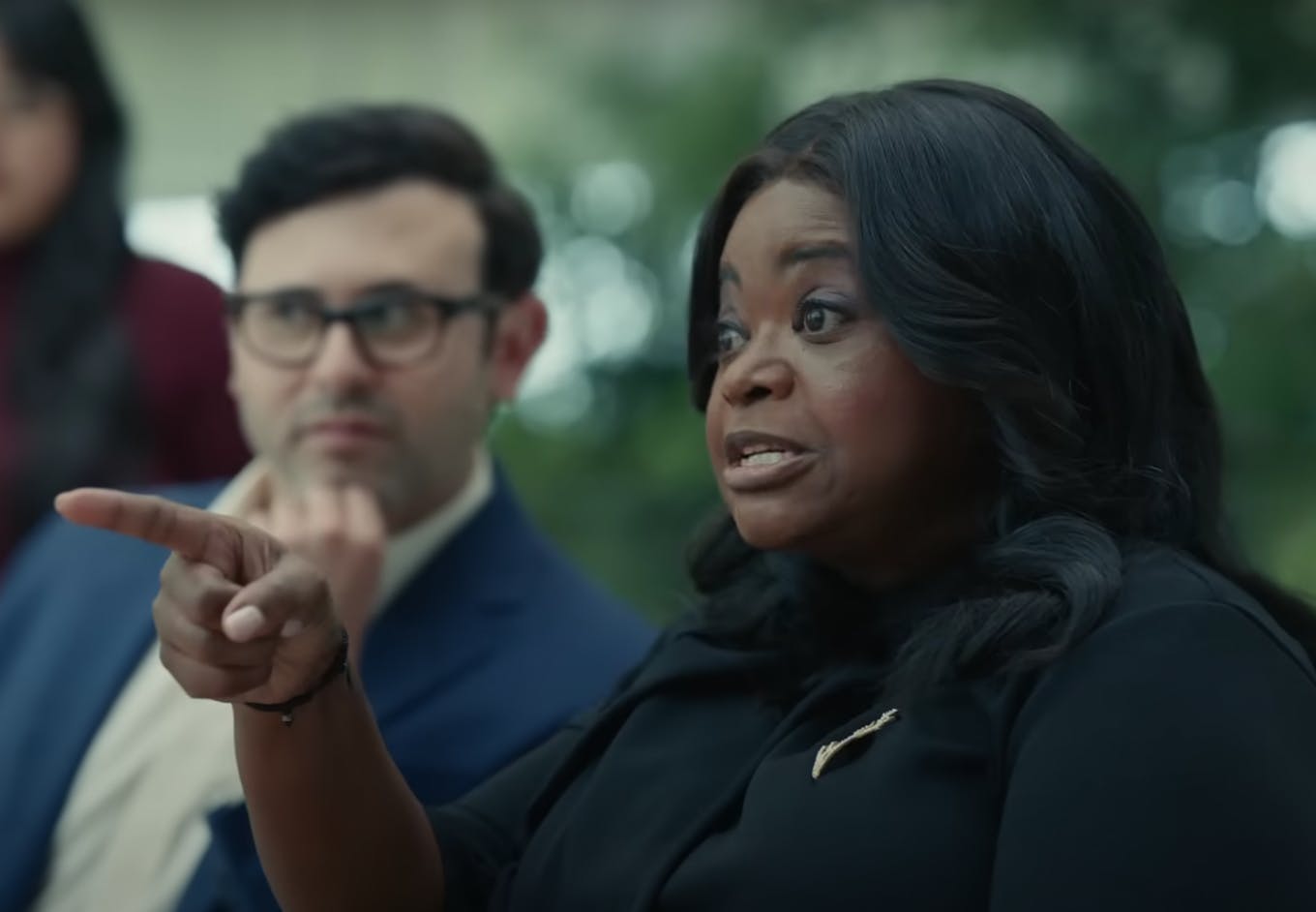
Octavia Spencer starred as Mother Earth in a video version of Apple’s sustainability report. Critics called it “woke capitalism at peak cringe”. Image: Apple on YouTube
September’s curtain-raiser event for the iPhone 15 was interluded with a video in which Mother Earth, played by Oscar-winning actress Octavia Spencer, critiqued but ultimately blessed Apple’s green credentials. Some praised the five-minute film for injecting a welcome dose of storytelling into the drab world of sustainability reporting, and were impressed by Apple’s track record on clean energy, reforestation, soil protection and plastic reduction. Others pointed out that Apple’s status update – like so many sustainability reports – cherry-picked environmental wins and glossed over the rest.
“Then stop making new phones every year. Make phones upgradable,” an X user tweeted in response to Apple CEO Tim Cook’s post of the video, referring to the concept of planned obsolence that critics say Apple pioneered. “You mass-produce your products in China, one of the world’s biggest polluters,” wrote another.
In an open letter, sustainability consultants Rajul Priyadarshini and Emma Bluck pointed to widely reported human rights and labour issues in Apple’s supply chain, which were not mentioned in the video, and the fact that Apple used the video as a sales pitch – to promote its first “carbon neutral” watch.
World Coal Association: “Sustainable” makeover

The coal industry association’s CEO Michelle Manook said the fossil fuel “is a legitimate participant in both economic development and emissions abatement.” Image: FutureCoal
When the World Coal Association rebranded to “FutureCoal: The Global Alliance for Sustainable Coal” in November, observers wondered if an April Fool’s joke had landed five months early. How “sustainable” can the single biggest cause of man-made climate change be? FutureCoal argued in its launch statement that for too long the coal sector had allowed “anti-coal sentiment to dominate and fragment us, which has resulted in a lowering of the global coal IQ.” By “coal IQ”, it meant the general level of understanding of coal’s contribution to society, and how abatement technologies can reduce pollution from burning the black stuff.
Bitasta Roy Mehta, a practitioner in the human resources sector audacity of labelling coal as green was almost amusing. “What next? Coca-Cola as a health drink?” With “sustainable coal”, everything now makes sense. It is about the sustainability of production that petro-associations at COP28 will be discussing,” pointing to the fossil fuels lobbying army present at the climate talks in Dubai.
Indonesia’s palm oil agency: Plantations are more climate-friendly than rainforests
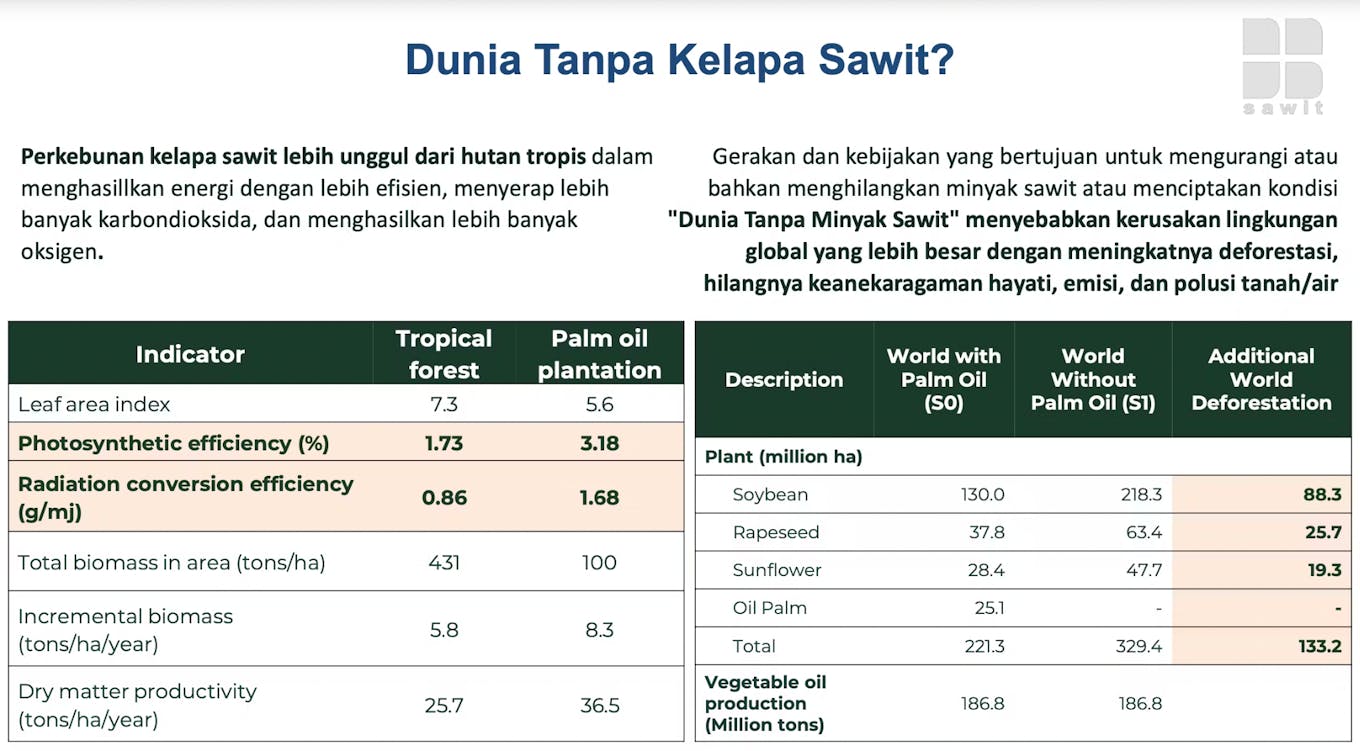
A slide presented by the Indonesia’s palm oil agency, which claims that palm oil plantations are better at absorbing carbon than tropical forests [click to enlarge]. The slide is titled “A World Without Palm Oil?” in Bahasa Indonesia. Image: Palm Oil Plantation Fund Management Agency (BPDPKS)
Speaking to an audience of farmers and Indigenous peoples at an event in August, a senior executive for Indonesia’s Palm Oil Fund Management Agency, the government’s palm oil finance agency, suggested that the crop is a more powerful carbon sink than the natural forests that it has replaced. Experts dismissed the claim as “goofy” and “criminally misleading”. The presentation was made as the Indonesian government was locking horns with the European Union over a deforestation law that makes forest-risk commodities such as oil palm, of which Indonesia’s is the world’s biggest producer, trickier to export.
Toyota: EV stalling
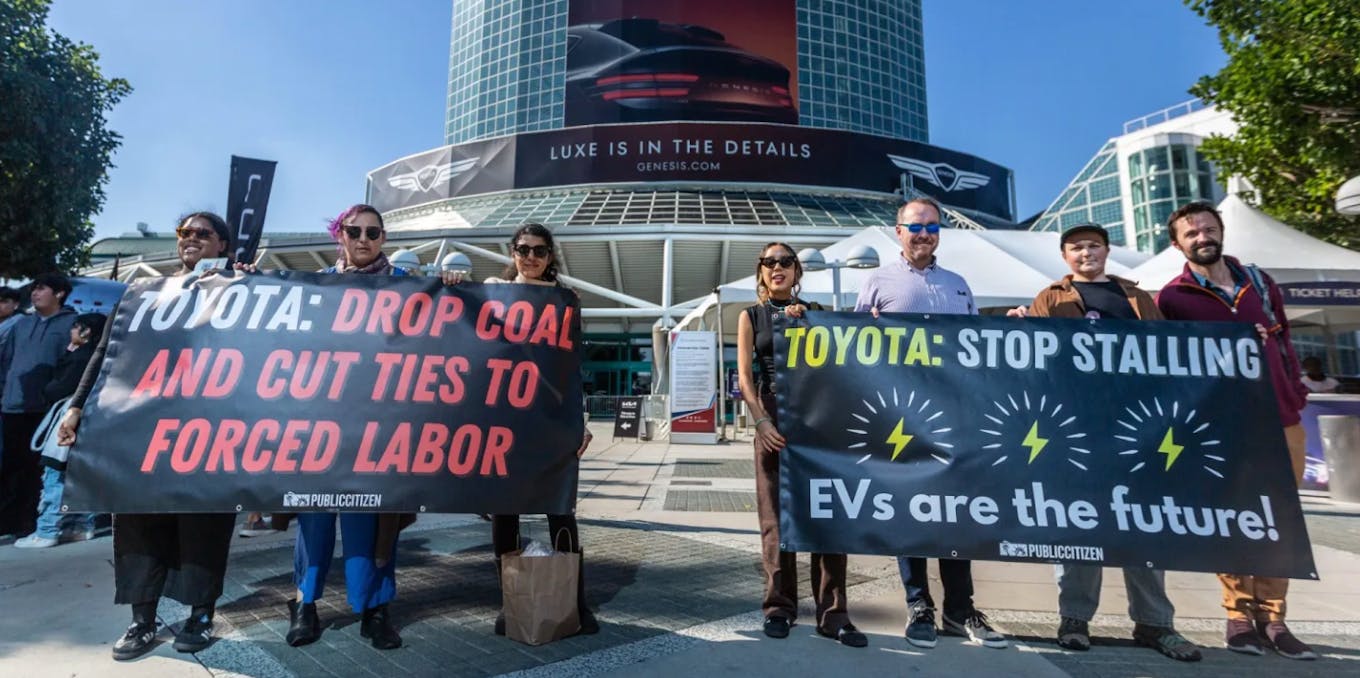
Protesters take Toyota to task over EV avoidance. Image: Electrek
Japan’s largest company seemed to have turn over a new leaf and embrace the vehicles electrification era earlier this year when it replaced its chief executive with a more pro-EV boss. New CEO Koji Sato has made some efforts to boost EV production, and Toyota has pumped US$8 billion into a new battery plant in the US. But critics say the automaker, in its marketing, is up to its “old tricks”. Toyota often confuses hybrid vehicles, which run entirely on petrol and derive no energy from non-polluting sources – with electric vehicles. The company also seems preoccupied by what critics suspect are unrealistic solutions, such as solid-state EV batteries, which they say will only push EV adoption timelines back.
Lufthansa: Planetary protection posturing
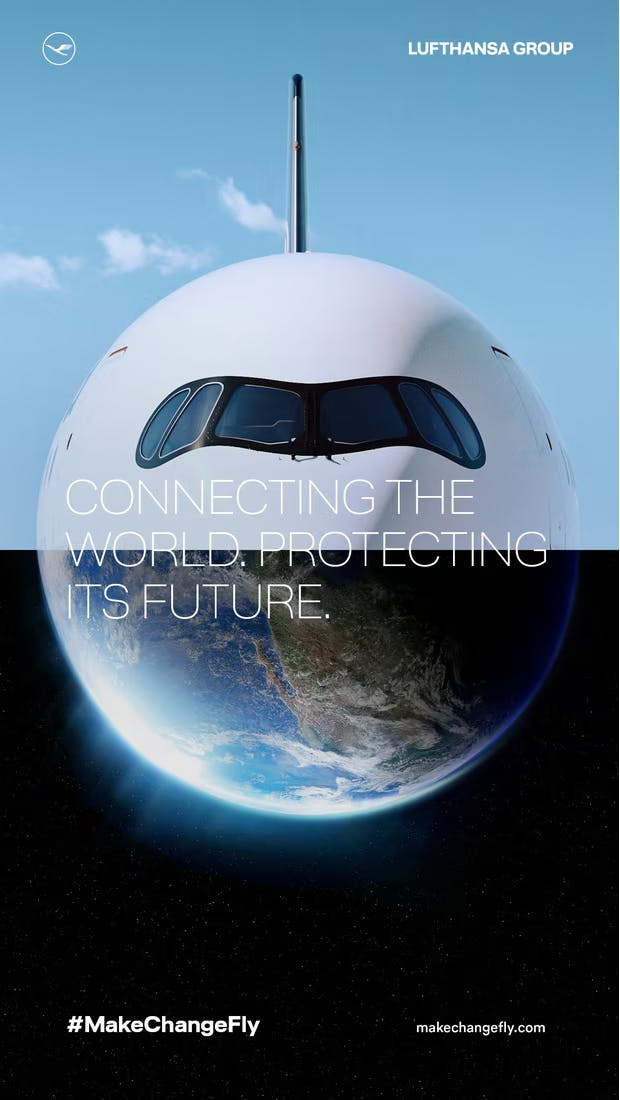
Lufthansa’s “Connecting the world. Protecting its future” campaign was banned by the UK’s Advertising Standards Authority for making a misleading green claims. Image: Lufthansa
An advertising campaign for Lufthansa was banned in the United Kingdom for making misleading claims about the German airline’s efforts to protect the planet. Britain’s Advertising Standards Authority (ASA) said there were no commercially viable technologies in the aviation industry which would substantiate Lufthansa’s claim that it was protecting the world’s future.
In its defence, Lufthansa – which has pledged to be carbon neutral by 2050 and half its emissions by 2030 – said the tagline was “open to interpretation” and argued that consumers would not see it as an “absolute promise” to protect the planet or that its planes did not cause harm. The ASA said brands in high carbon emitting sectors shouldn’t make claims that give consumers a false impression about plans they can’t substantiate.
Austrian Airlines: “Climate-friendly” aviation
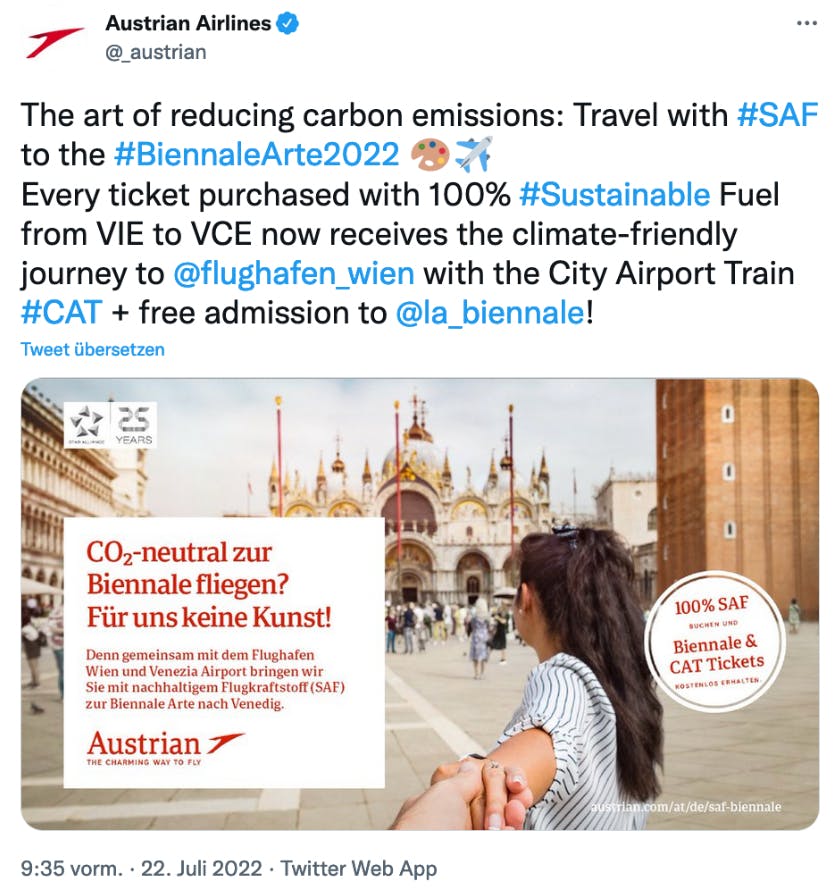
A tweet for Austrian Airlines ‘CO2-neutral’ flight to Venice. Image: X
In a bad year for the Lufthansa group’s green credentials, the company’s Austrian subsidiary was found guilty of greenwashing by a court in Korneuburg for leading consumers to believe that by using sustainable aviation fuels (SAF), “climate-friendly” air travel was now possible. The court reasoned that SAF still emits CO2 when burned and are blended with fossil fuels. Austrian Airlines promised to provide “clearer” information in future on the use of “sustainable” fuels. The ruling did not include any financial penalties.
S.E.A Aquarium: Can it say it is an ocean steward if dolphins are still kept captive?
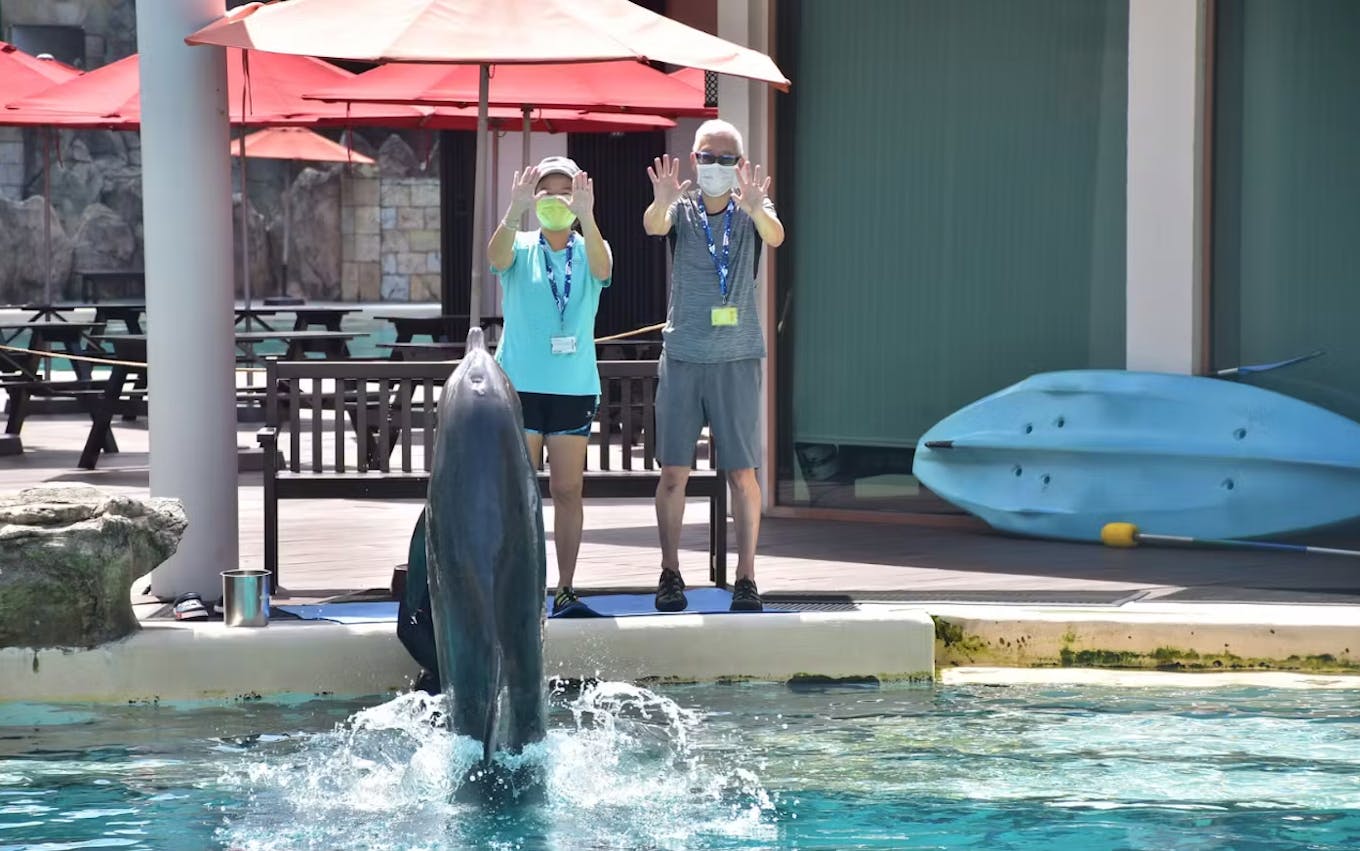
S.E.A Aquarium’s dolphin attraction. Image: S.E.A Aquarium
An educational promotion to attract parents and their children to visit Singapore’s Southeast Asia Aquarium to learn about ocean conservation in celebration of World Oceans Day omitted the fact that the tourist attraction houses more than 20 Indo-Pacific bottlenose dolphins that were caught from the wild. The irony was not lost on animal welfare groups, who said that letting these highly intelligent mammals go would be the best way to educate kids about responsible ocean stewardship.
Petronas, Shell and Repsol: Only talk about renewables
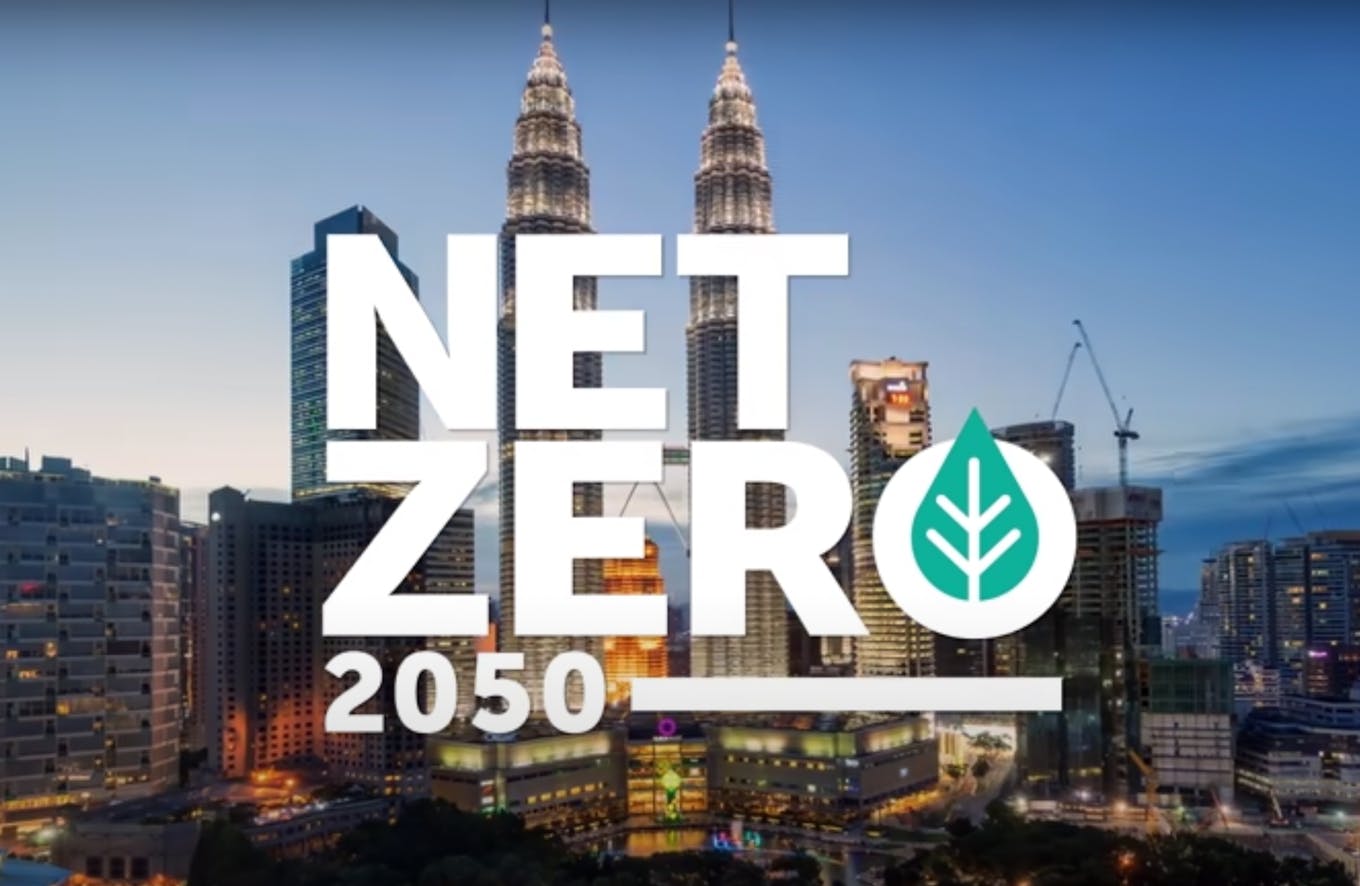
Petronas net zero commercial claimed the company was “part of the solution” that for a more sustainable planet. Image: Petronas
“Chances are, you’re going to need to add some balance to your ads,” said Guy Parker, chief executive of the UK’s Advertising Standards Authortiy (ASA) in an interview with Bloomberg Green. Parker was talking about ads by Malaysian oil giant Petronas and European majors Shell and Repsol whose campaigns were banned by the ASA for chest-beating about their investments in renewables without mentioning the extent of their businesses’ overall climate impact. A September ad for Petronas claimed that it was “enriching lives for a sustainable future”, but the ASA said the ad failed to mention the company’s carbon emissions and gave the impression that Petronas was already having a positive environmental impact. Malaysian environmental group Rimbawatch has also questioned the accuracy of Petronas’ reported emissions, pointing out that although the company said it was as yet unable to fully measure its emissions, they had in fact reported their Scope 3 in their 2022 integrated annual report based on the emissions of the companies they have stakes in.
Australian Petroleum Production & Exploration Association: ‘50% cleaner” than what?
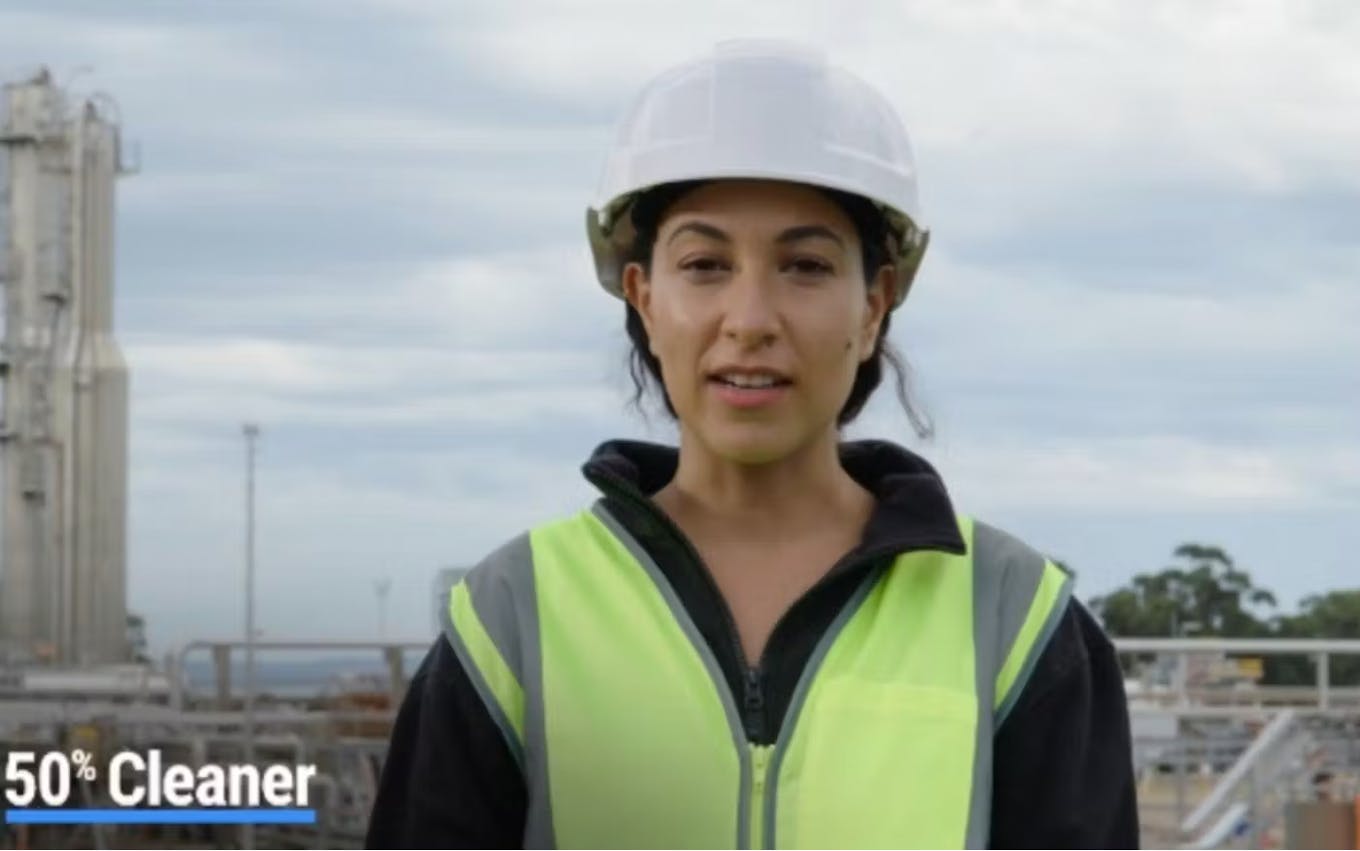
An ad for APPEA was banned because Australia’s ad watchdog determined that the claim that natural gas is ‘50 per cent cleaner’ was not substantiated. Image: APPEA
An ad for Australia’s petroleum lobby group was banned by the country’s ad watchdog for claiming that natural gas is “50 per cent cleaner” without clearly specifying what it was cleaner than. In one of the ads, a worker wearing protective gear says: “As Australia shuts down coal, gas is picking up the load”. Another worker later says, referring to gas: “It’s 50 per cent cleaner, so together with renewables it gets emissions down.” But this was problematic, complained law firm Environmental Defenders Office on behalf of non-profits Comms Declare and Lock the Gate. “It is a blanket and misleading statement that gas is ‘green’, when in truth the exploration, extraction, transport, processing and logistics of gas are very damaging to the environment and emit a lot of greenhouse gas – especially methane,” read the complaint. Australia’s ad watchdog upheld the complaint, marking a rare occasion in which an advertisement has been banned in Australia for making a misleading or unsubstantiated green claim.
Prism+: Airconditioners that save the planet
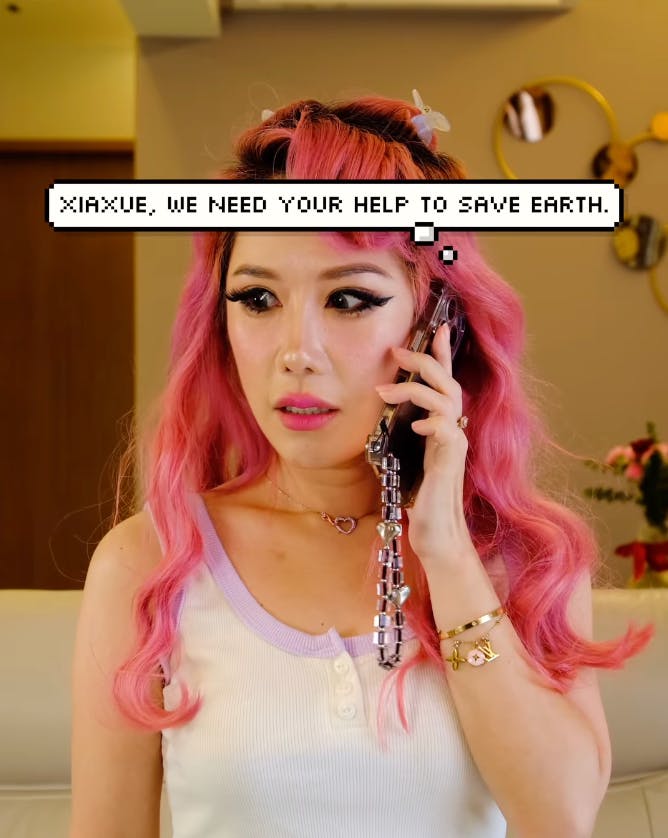
Ad for Prism+ aircon units featuring Singaporean influencer Xiaxue. Image: Prism+ on Instagram
An airconditioner – one of the most energy-intensive home appliances – that can save the planet? Singapore-based consumer electronics brand ran a social media campaign in which influencer Xiaxue is called by a fictional president who asks for her help to “save Earth”. In response, Xiaxue puts on winter clothing, sets the airconditioner to 23 degrees Celsius, and snuggles under a blanket. “Save Earth and electricity with 5 ticks energy saving,” reads the caption. Professor Lawrence Loh, director of the Centre for Governance and Sustainability at National University of Singapore Business School, told Eco-Business that the advertisement was guilty of what a recent study found to be the most common form of greenwashing in Singapore – making vague claims unsupported by specific data sources. The video was called out by the Advertising Standards Authority of Singapore – the first ad to be removed in Asia for greenwashing.
Etihad: not zero?
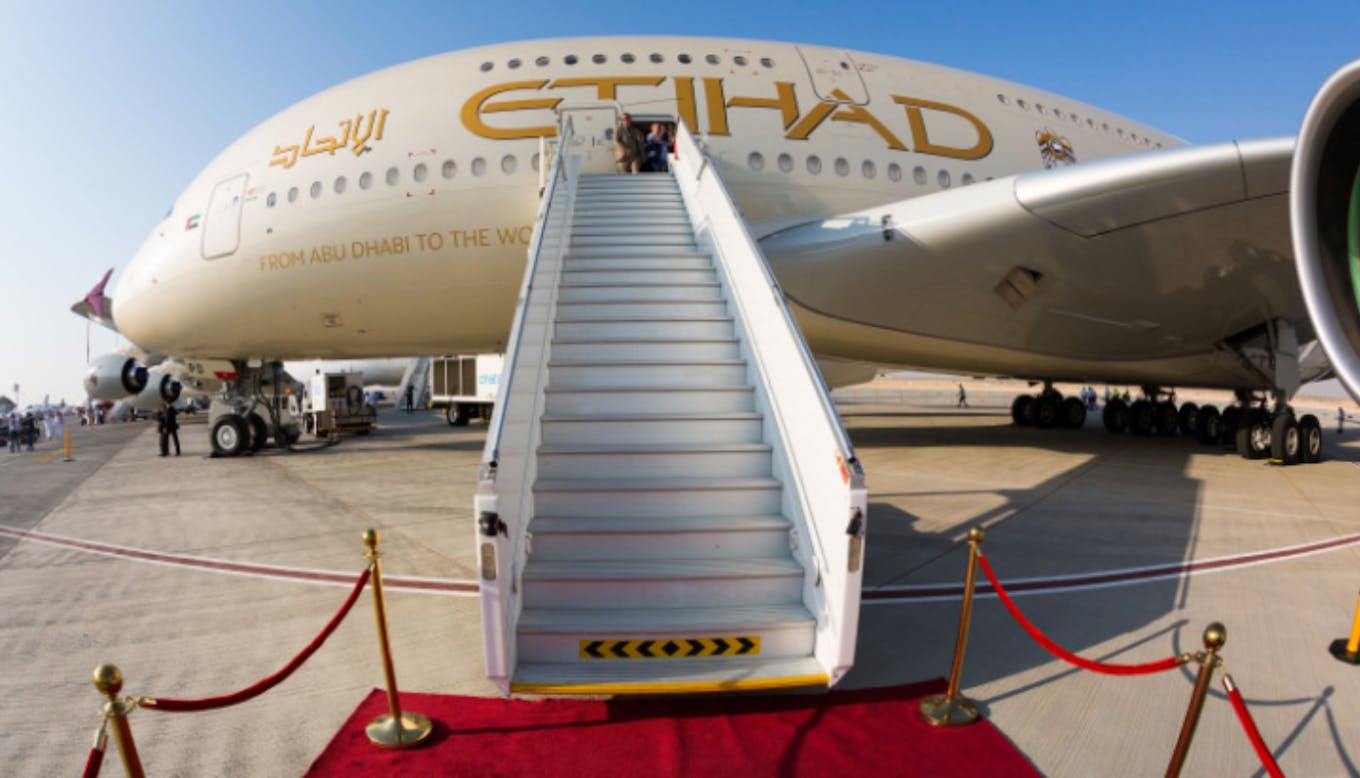
Etihad’s ad campaign in Australia prompted a complaint about the credibility of its net-zero claim. Image: M101Studio / Shutterstock
Activist group Flight Free Australia took issue with airline Etihad’s claim in its advertising campaign in Australia that it had a credible path to net zero emissions by 2050. The group said in its complaint to the Australian Competition and Consumer Commission that Etihad’s ads, which ran on digital ad banners during an A-League football match in February 2022, conveyed the misleading impression that flying with the Abu Dhabi-based airline does not have much of an environmental impact and that it has plans and reasonable grounds for expecting it will reach the 2050 target. Etihad advertised the words “net zero emissions by 2050” next to its logo, and in another ad, claimed “Flying shouldn’t cost the Earth.”
Coca-Cola, Danone and Nestlé: Plastic promises?
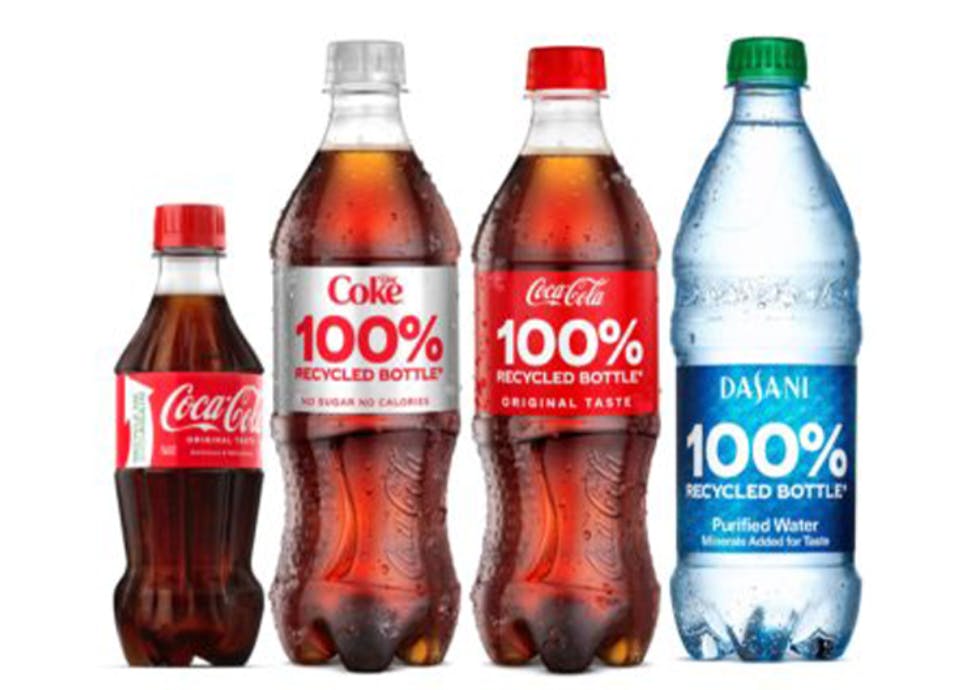
Coca-Cola’s range of “100 per cent recycled” packaging. Image: Coca-Cola
The three consumer good giants were accused of making misleading claims about their single-use plastic water bottles being “100 per cent recycled” or “100 per cent recycled” by the European Consumer Organisation, a consumer rights group, backed by environmental nonprofits Client Earth and ECOS. The complaint to the European Commission argued that Danone, Coke and Nestlé’s packaging is never made entirely of recycled materials, and their recylability depends on factors such as available waste management infrastructure – which in many Asian countries is lacking or absent. “A ‘100 per cent’ recycling rate for bottles is technically not possible and, just because bottles are made with recycled plastic, does not mean they don’t harm people and planet,” said Rosa Pritchard, plastics lawyer at ClientEarth. In response, Nestlé said it was cutting use of plastic packaging, Danone said it was continuing to invest in recycling infrastructure, and Coca-Cola said its claims can be substantiated.
City Energy: Go “green” with gas

An ad for City Energy in Singapore, promoting gas-powered water heaters as a way for consumers to “go green”. Image: City Energy / Instagram
Singapore gas company City Energy ran a campaign with local mobile phone company M1 in September offering discounts on gas-powered heaters it said would help consumers “go green”. The campaign informed consumers that they could heat water more sustainably and make cost savings with gas compared to electric storage water heaters, citing data from Singapore’s National Environment Agency (NEA). Critics say that marketing a fossil fuel-based product as a green solution is misleading at a time when the world is trying to wean itself off dirty energy.
Nike: Plastic-based “Sustainability” collection
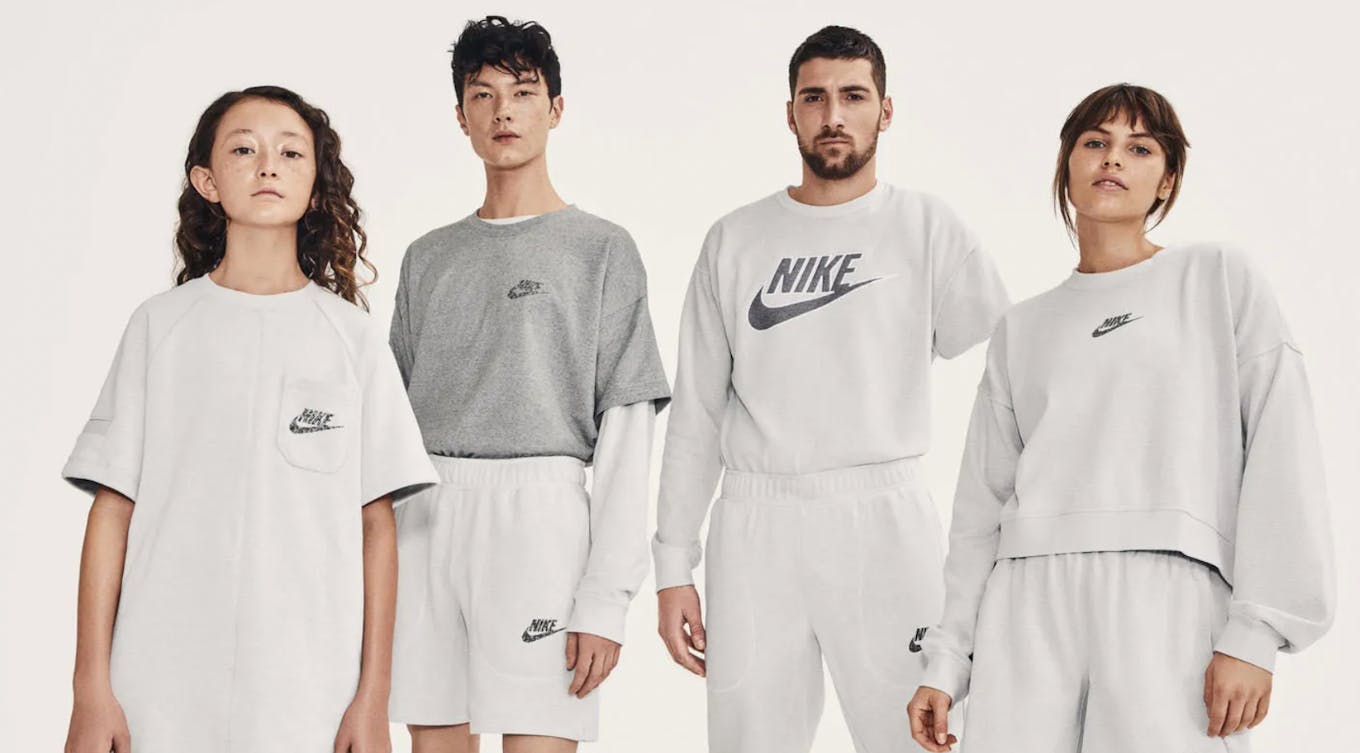
Nike’s “sustainability” collection is not “made with recycled fibers” as advertised, the law suit claims. Image: Nike
Nike was sued in a US district court for its “Sustainability” collection, 90% of which the law suit alleged were not “made with recycled fibers” as advertised and are made mostly of virgin synthetic materials that are known to be bad for the environment. The lawsuit pushed for Nike to launch a “corrective advertising campaign” and reimburse consumers who the case argued were duped into believing the company’s products were green.
Saudi Aramco: Oil giant plants some mangrove trees
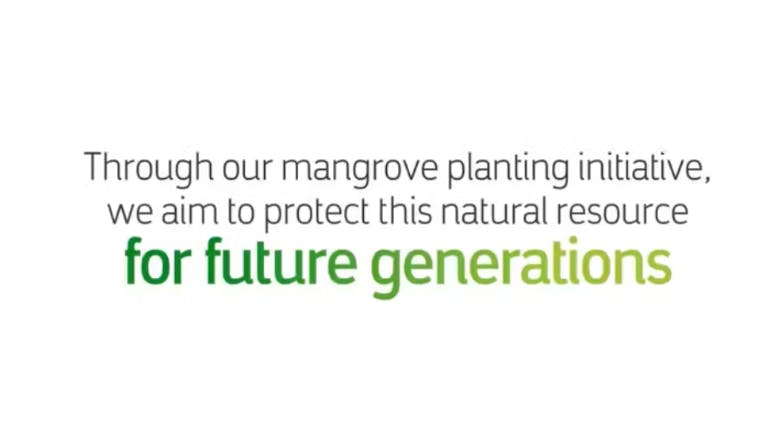
In Saudi Aramco’s mangrove planting video, the company said it has planted 24 million trees over the past two decades. Image: Saudi Aramco on LinkedIn
Among the deluge of suspiciously positive comments (astroturfing?) left beneath Aramco’s LinkedIn campaign to promote its mangrove-planting efforts to its 4 million+ followers were posters who were less convinced by the world’s largest oil company’s green crusade. “Greenwashing?! Please Aramco, show your responsibility in exiting all your polluting activities and transforming these to sustainable and respectful businesses,” wrote one poster. “Greenwashing while destroying the planet. 🤦🏻♂️ shame on you – and fire your PR team 🤢” wrote another.
TotalEnergies: Rebranding oil expansion
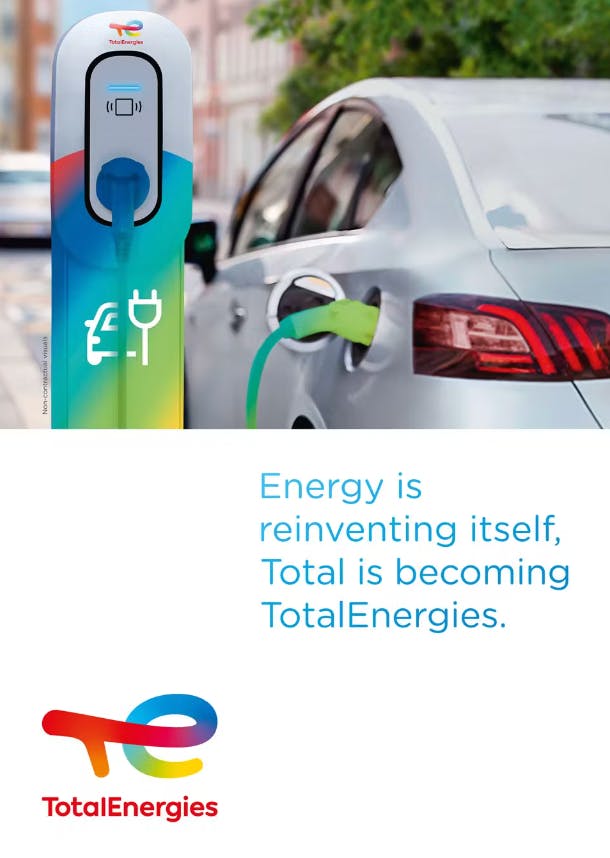
TotalEnergies “Reinvention” rebranding campaign. Image: TotalEnergies
In May, a landmark greenwashing legal case against French oil and gas firm TotalEnergies was allowed to proceed. The complainants, nonprofits Greenpeace, Friends of the Earth and Notre Affaire a Tous, backed by ClientEarth, argue that TotalEnergies’ “Reinvention” rebranding campaign violates European consumer law by misleading the public over what the company’s plans really mean for the climate crisis. The main point of contention is that TotalEnergies’ business plans include the expansion of fossil fuel production. The complaints also argue that the company “appears to be avoiding any significant emissions reductions all the way through to the end of the decade.”
Shell: Renewables overclaiming?

A Shell petrol station undergoing renovation in Singapore. Image: Robin Hicks/Eco-Business
The anglodutch oil major misleadingly overstated how much it is investing in clean energy, according to non-profit Global Witness, which lodged a complaint with the US Securities and Exchange Commission (SEC) in February. In Shell’s annual report, the company stated that 12 per cent of its capital expenditure was channelled into a renewables division in 2021. The unit’s webpage says it is investing in “wind, solar, electric vehicle charging, hydrogen, and more”. Global Witness argued that 1.5 per cent of Shell’s capital expenditure has been used to develop genuine renewables, such as solar and wind, but much of the rest of the division’s resources were being pumped into fossil gas.
JBS: Meatless green bonds
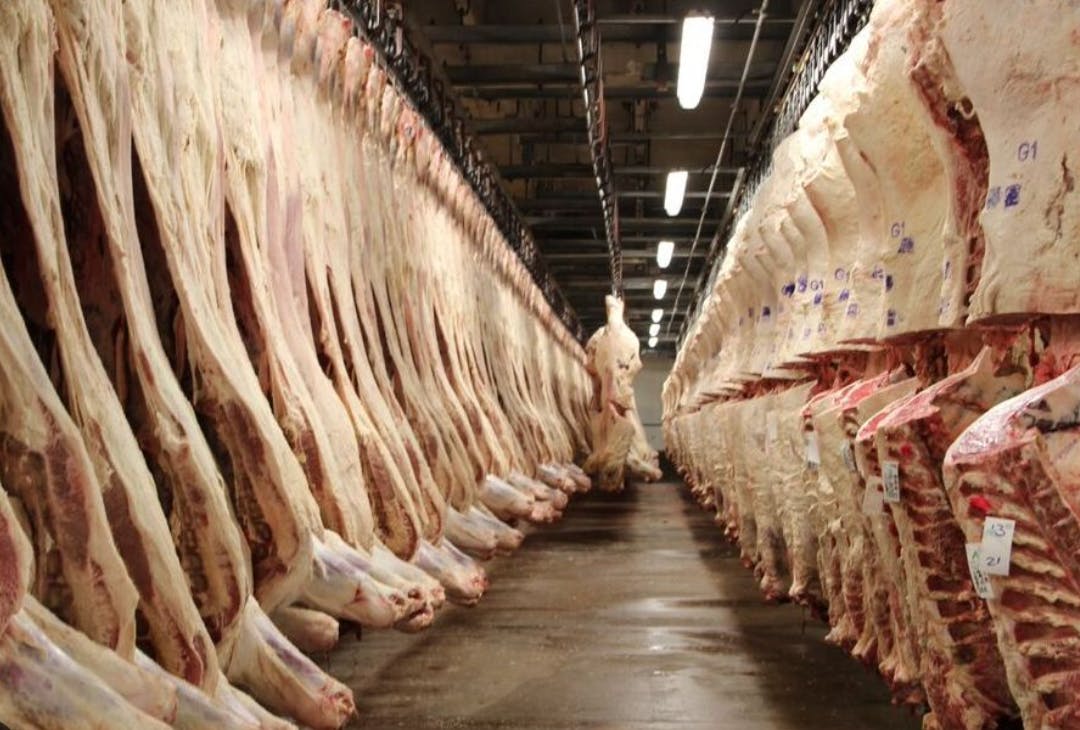
Beef carcasses hang in the sales cooler at the JBS beef plant in Greeley, Colo. Image: Stephanie Paige Ogburn/KUNC
The world’s largest meat producer was on the receiving end of a complaint by environmental group Mighty Earth to SEC over the company’s “misleading and fraudulent” green bonds. Mighty claimed that the US$3.2 billion in debt issuances or sustainabilty-linked bonds by JBS, that were tied to the company’s stated goal to achieve net-zero by 2040, were suspect because its emissions have increased in recent years, and excluded Scope 3 supply chain emissions that comprise at least 97 per cent of its climate footprint.
Have we missed any? Almost certainly. Let us know by writing to news@eco-business.com. This story is part of our Year in Review series, which journals the stories that shaped the world of sustainability in 2023.

